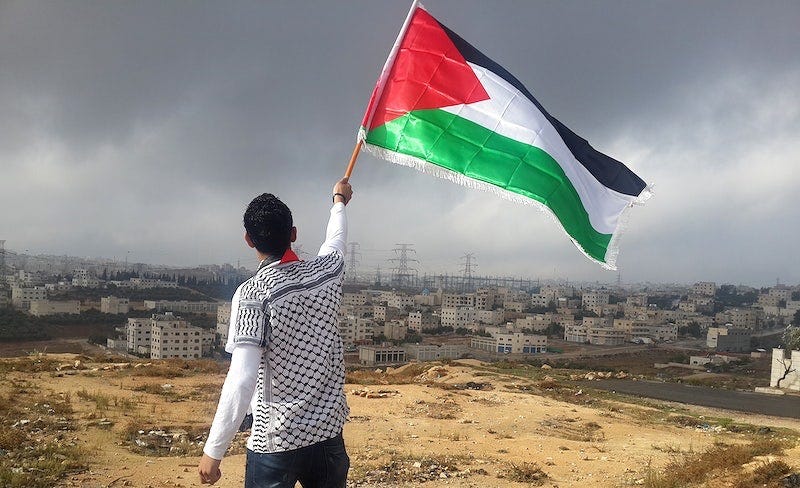Recognition Of Palestine Will Not End A Genocide Only Real Action Will
Recognition shouldn't be separate from the conversation of arming Israel

Sunday 21 September | Written by Dominick Skinner
The governments of the United Kingdom, Canada, and Australia have now officially recognised the State of Palestine, while Luxembourg, Malta, San Marino, Andorra, Portugal, France and Belgium have all confirmed that they will follow suit. The move, which at first glance looks like a turning point in the way the West approaches the question of Palestine after decades of carefully avoiding any move that would anger Washington or Tel Aviv, yet when examined with more scrutiny, what emerges is not the breakthrough many would hope for but rather another moment where symbolism is allowed to substitute for the only measures that can actually make a difference.
Recognition of Palestine does not alter the daily reality in Gaza or the West Bank where Israel continues to bomb, occupy, and expand settlements in direct violation of international law, and it does not cut the flow of weapons, spare parts, and critical technologies that sustain those operations, which means that for Palestinians living under siege the effect of these recognitions is negligible at best. The governments who took this step remain unwilling to touch the one lever that Israel cannot ignore, which is the material support provided through arms sales, joint production lines, and trade relationships that allow Israeli forces to operate with impunity.
The historical record shows that recognition has little force when it is not paired with consequences, and the most relevant example is South Africa, which was recognised and engaged by many governments right until the point at which sanctions, sports boycotts, divestment campaigns, and arms embargoes turned the apartheid regime into a pariah, and only then did the system begin to collapse. Israel has long calculated that it can withstand statements of concern and even formal recognitions so long as the weapons continue to arrive and the trade continues to flow, and nothing in the decisions announced this week changes that calculation.
Other governments have already moved further, which demonstrates both that it is possible and that it carries no catastrophic cost, with countries such as Spain and Norway suspending arms exports and Belgium freezing military licences linked to Israel, while South Africa has gone even further by leading cases at the International Court of Justice and refusing any pretence that Israel is acting within the limits of international law. These governments have not suffered international isolation or economic collapse for doing so, they have simply chosen to take international law seriously, and that is the example that should be followed if the stated goal is to bring an end to the killing in Gaza. Historically, moves against Israel would result in threats from the USA that diplomatic punishment would somehow follow, which prevented a lot of earned criticism, but the moves of American partners have recently furthered Israel’s isolation, not their own.
In other genocides and mass atrocities military intervention has not only been discussed but has in some cases been carried out with the support of many of the same governments who today stop short of even ending their arms sales to Israel, and this fact should be understood as part of the wider hypocrisy. The NATO bombing of Serbia during the Kosovo conflict was justified on humanitarian grounds, framed as the urgent need to prevent further ethnic cleansing, and similar arguments were used to defend interventions in Libya and even in parts of Africa where the scale of violence was smaller than what Palestinians are enduring now.
The point is not to argue that foreign military intervention is the preferred path, because the record of such actions is mixed and often leaves behind devastation of its own, but to underline that when Western governments believe an atrocity is unacceptable they have shown themselves willing to consider or deploy force, while in the case of Palestine even symbolic measures like sanctions or embargoes are avoided. This makes clear that the question is not about principle or precedent but about political will and the choice to protect Israel from consequences that other states in similar or even less severe situations have faced.
The United States is the central reason why recognition has become the fallback option for many of its allies, because Washington continues to supply Israel with vast amounts of weaponry and financial aid while also blocking every attempt at accountability at the United Nations, and that complicity means that the United States is not merely looking the other way but is directly involved in sustaining the war and the wider occupation. It is precisely because the United States provides cover and material support that other governments choose symbolic recognition rather than the kind of measures that would directly challenge Washington and Tel Aviv, which makes these gestures safe but largely meaningless.
If ending the genocide were the priority then the steps would be clear and unambiguous: halt arms sales, suspend trade that feeds the occupation, and use diplomatic weight to turn Israel into a pariah in the way South Africa once was. Until that happens, recognition risks being treated not as a moment of solidarity but as a substitute for real action, and Palestinians deserve more than symbolic words while the bombs and bullets keep coming.




